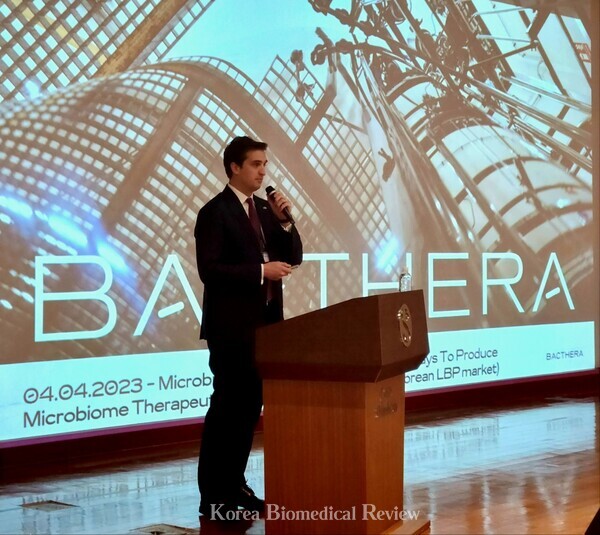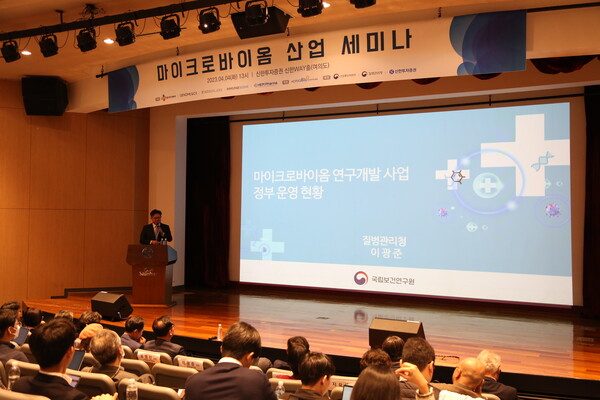Despite being a latecomer to the microbiome industry, Korea still shows high potential, experts said.
Several domestic and foreign industry experts gathered for the microbiome treatment seminar organized by the Korea Biotechnology Industry Organization (KoreaBIO) at the Shinhan Investment Hall in Yoeuido, Seoul, Tuesday.

Genome & Company CEO Pae Ji-soo drew parallels with Korean conglomerates like Samsung and Celltrion which also had relatively late starts compared with their American counterparts but still managed to dominate their respective industries.
Bacthera's Chief Commercial Officer Felix Faupel, an expert in Contract Development and Manufacturing Organization (CDMO), mentioned that the live biotherapeutics (LBP) market in Korea is the world's fastest-growing market. He observed that Korea has a unique focus on single-strain products in comparison to the US, Europe, and other regions where there is a balance between the use of single-strain LBPs, defined consortia, and genetically modified organisms (GMOs). He attributed this focus to Korea's prior experience in the probiotics industry.
In particular, he noted that Korea demonstrated a 64 percent jump in microbiome therapeutic preclinical and clinical programs from 2020 to 2023.
“If Korea continues at this pace, it has a very good chance of overtaking the global market in the coming years,” Faupel remarked.
He also highlighted that while the U.S. market mainly focuses on infectious diseases with microbiome therapeutics, Korea is targeting blockbuster drugs in oncology and innovative drugs related to gut-brain access (GBA).
GBA refers to the bidirectional communication network that links the enteric and central nervous systems in the human body, and is often targeted with microbiome therapeutics.
“There seems to be a focus on unmet medical needs like Alzheimer's or Parkinson's disease in Korea,” he said, based on his market analysis.
From a CDMO perspective, he discussed the challenges in developing bacterial strains for microbiome therapeutics, but added that the use of innovative technologies such as electrostatic spray drying (ESD) and enteric capsules can help mitigate the time and costs associated with the process.
Faupel also commended the governmental support for the microbiome industry in Korea, saying, "Government support is crucial as there are not many multinational companies exploring the microbiome industry except for Ferring Pharmaceuticals."
In November 2022, Ferring Pharmaceuticals' Rebyota became the first FDA-approved microbiome-based therapeutic to treat recurrent Clostridium difficile Infection (rCDI) via rectal route administration. Currently, expectations are high for Seres Therapeutics’ SER-109 oral rCDI microbiome drug to be FDA-approved next.

Other speakers inlcuding Korea Evaluation Institute of Industrial Technology (KEIT’s) Bio-Program Director Kim Hyeong-cheol and Korea Disease Control and Prevention Agency (KDCA) Director Lee Gwang-jun outlined the government’s new plans to promote a microbiome pan-ministerial support project with a budget of 400 billion won (approximately $304 million).
The previous 1.1 trillion won pan-ministerial national microbiome project announced last year by the government was scrapped as it was criticized for not being goal-oriented as it contained too many different projects, explained Kim.
As such, government institutions including the Ministry of Science and ICT, the Ministry of Health and Welfare, the KDCA, the Ministry of Agriculture, Food and Rural Affairs, and the Ministry of Food and Drug Safety will engage in joint R&D projects to target specific brain diseases and anticancer drugs, he added.
However, some critics in the audience pointed out that while the government's plans were research-oriented, there was a need to focus more on developing clinical assets to enable Korea to lead the industry.
Related articles
- CJ Bioscience targets microbiome-based new drugs
- HealthBiome’s HB03 microbiome anti-cancer drug bags domestic patents
- GI Biome scores local substance patent to reduce sarcopenia symptoms
- Celltrion, LISCure Biosciences to co-develop microbiome-based Parkinson's disease treatment
- Researchers capture images of reactive astrocytes in brain revealing new Alzheimer’s target
- Microbiome Asia to showcase Korea's rapidly growing microbiome industry
- 3BIGS, Indian hospital to develop gut microbiome test kit
- ‘Mixed culture microbiome therapeutics is holy grail but repeatability remains an issue’
- FMT offers cures for antibiotic-resistant therapies, but industry looks other way
- 'Leveraging multiomics to solve microbiome issues for Korean LBP firms'

